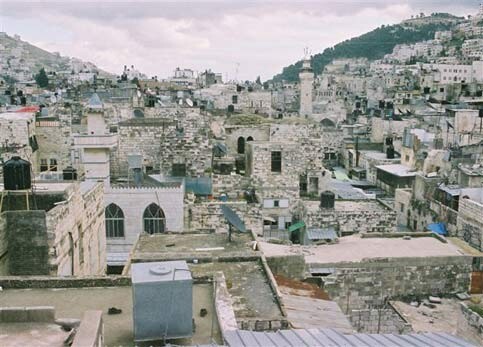IRIN 5 February 2007

The ancient city of Nablus is home to more than 200,000 people. (Shabtai Gold/IRIN)
NABLUS, 5 Feb 2007 (IRIN) - Israeli moves to control movement in and out of the city of Nablus are thwarting humanitarian aid efforts and damaging the local economy, according to aid agencies and local residents.
Israeli checkpoints surrounding the city of more than 200,000 people mean that no vehicle can leave or enter Nablus without an Israeli permit. The United Nations Office for the Coordination of Humanitarian Affairs (OCHA) said that such permits are difficult to obtain, particularly for Palestinians.
Liz Sime, from the US-based global humanitarian organisation CARE International, said that, “[our] teams lose up to two hours each time they try to exit Nablus, raising costs at an unreasonable rate”.
She added that her organisation, which runs medicine delivery programmes, would like the Israeli army to open special routes for the transport of humanitarian aid.
The UN agency for Palestine refugees (UNRWA) said it was experiencing the same problems as it tries to deliver food and medical aid to more than 42,000 refugees.
There have also been reports that local doctors, social workers and school inspectors working with refugee populations in the Nablus area have not been able to see as many of their patients and clients due to the roadblocks and checkpoints.
“The local economy and industry of Nablus city is being crippled by the tight closures,” said Kirstie Campbell of the UN’s World Food Programme. At present, her organisation runs two short-term emergency projects in Nablus benefiting about 10,000 families, or some 70,000 people.
Aid workers argue that lifting the restrictions - which have been in place for six years - would allow for freedom of movement, and could boost the local economy by eight percent. That compares to the four percent annual increase the economy currently receives as a result of humanitarian assistance.
The local economy has also been hit by a lack of foreign investment following the economic boycott by the US and EU after the Hamas government came to power last year.
The checkpoints have made life harder for residents.
“The Israeli checkpoints make ordinary life impossible. Palestinians have to negotiate these to get to markets, jobs, hospitals and schools, let alone just to visit family and friends,” David Shearer, head of UN OCHA in Jerusalem, said.
Unemployment and crime are on the rise.
Only several hundred residents have permits allowing them to enter Israel to work, and job opportunities in the city are few and far between. Unemployment has risen from 15 percent in 2000 to over 70 percent now, according to Deputy Mayor Hafez Shaheen.
“The youth set up gangs because of the poverty,” said a local resident who spoke on condition of anonymity. He added that these groups are behind the recent kidnappings and fighting between the Hamas and Fatah factions in Nablus.
In addition to the clamp-down on movement, the situation in Nablus is compounded by Israeli military raids in the city.
“The Israeli military raids occur almost nightly,” Alaa Yousef, a Nablus resident who works at the local Al-Najah University, said. “I am afraid of losing my house. I saved money for 20 years to build it, and now I don’t know what will happen.”
The city, which once had a growing economy even during the intifada (Palestinian uprising against Israeli occupation) years, is now home to empty factories and its civil servants are no longer receiving regular salaries.
A recent promise by Israel to lift restrictions was not met, but instead led to new checkpoints, raising transportation costs in Nablus by 35 percent.
This item comes to you via IRIN, a UN humanitarian news and information service, but may not necessarily reflect the views of the United Nations or its agencies. All IRIN material may be reposted or reprinted free-of-charge; refer to the copyright page for conditions of use. IRIN is a project of the UN Office for the Coordination of Humanitarian Affairs.
Related Links